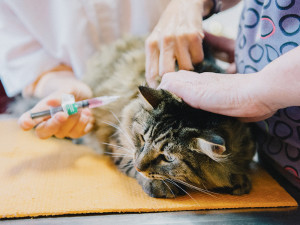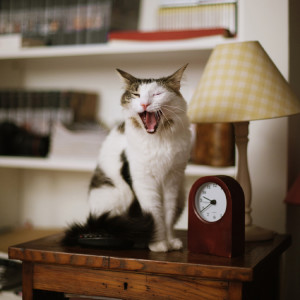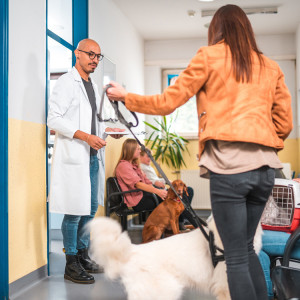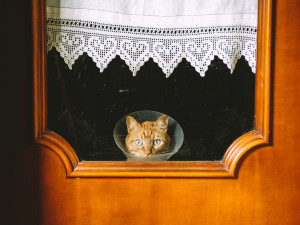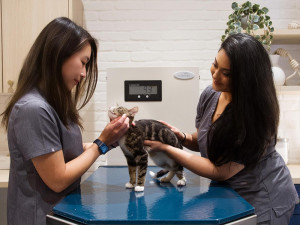Can Cats Actually Get the Common Cold?
They’re not exactly blowing their noses and rubbing Vicks on their chests, but here’s what you need to know.

share article
In this Article:
Symptoms of Colds in Catsopens in a new tab Upper Respiratory Infections in Catsopens in a new tab Are Cat Colds Contagious?opens in a new tab When to Seek Veterinary Care for a Coldopens in a new tab Home Remedies for Cat Coldsopens in a new tab Tips for Preventing Cat Coldsopens in a new tab
Does your cat’s runny nose, sneezingopens in a new tab, and congestion make you want to offer them an entire box of tissues? And no, that’s not that weird of a thing to ask; cats can get colds just like people. The causes of a “cat cold” or upper respiratory infection (URI)opens in a new tab in a cat are different from those seen in humans, though, so it’s nice to know that you don’t have to worry about snuggling with your kitty for comfort when you’re feeling sick. You won’t pass on your nasty cough to them, and they can’t pass on their runny nose to you.
Cat colds can sometimes be quite, well, dramatic (who’s shocked?). It’s understandable to be concerned about your fuzzball’s health when they look and sound like a snotty baby. Here’s what can cause these cold-like symptoms and what you can do to help your feline friend.
What are the symptoms of colds in a cat?
Cats with URIs can show a variety of signs that they’re having problems. Some cats with a mild cold can have a runny noseopens in a new tab, sneezing, and audible congestion when they breathe. Kitties who are dealing with mild infections can still feel great and be their normal, playful selves.
Greenish discharge from the nose or eyes, swollen eyes, squinting, coughingopens in a new tab, lethargy, and fever can be signs of a more serious infection. A hoarse “meow” may accompany these symptoms — and can sound quite pathetic. In severe cases, ulcers in the mouth, open-mouthed breathing or pantingopens in a new tab, loss of appetiteopens in a new tab, and dehydrationopens in a new tab are possible.
Like the common cold in people, most URIs run their course in about five to 10 days. Kittens, older cats, and cats with compromised immune systems may have more trouble fighting off infections. Infections in these pets may last longer or be more severe.
Here are some symptoms of colds in cats to look out for:
Runny nose
Sneezing
Congestion
Green discharge from nose or eyes
Swollen eyes
Squinting
Coughing
Lethargy
Fever
Poor appetite
Congestion or sniffles
Enlarged lymph nodes
What causes upper respiratory infections in cats?
Most cat colds are caused by a viral infection. The two viruses that cause most upper respiratory issues in cats are feline herpesvirus and feline calicivirusopens in a new tab. There are sometimes bacteria involved as well, most commonly Chlamydia felis or Mycoplasma felis. Don’t worry: These versions of herpes and Chlamydia aren’t the ones you learned about in health class. Both feline herpesvirus and feline calicivirus are highly contagious, and they can quickly spread in places where multiple cats live together, like rescues or sheltersopens in a new tab.
Bacterial URIs rarely occur by themselves, but a viral URI can sometimes set the stage for a secondary bacterial infection that will make your cat’s symptoms worse or slow their recovery. Just like in people, herpes is forever and enjoys reappearing during times of stressopens in a new tab. Your vet can test to determine which annoying bugopens in a new tab is causing your cat to be sick. But they won’t always do this because cats are often recovering by the time the results return, and the treatment is the same for most causes.
What other things can look like a feline URI?
Not every cat with a runny nose has a cold. If your cat’s symptoms are very severe or persist past a couple of weeks, other causes may need to be considered. Allergies, nasal polyps or tumors, severe dental diseaseopens in a new tab, or foreign objectsopens in a new tab (like a blade of grass) in the nose can all cause similar signs.
Are cat colds contagious to other cats or people?
If you’ve been sniffling, your main concern may be “Can cats catch my cold?” Fortunately, human and cat colds are very different, so you can’t give your cat the sore throat that’s been plaguing you.
Unfortunately, though, viral URIs tend to be very contagious to other cats, especially housemates who are in close contact. The herpesvirus cannot survive for a full day outside of its host, but calicivirus can last for up to a month in the environment. This means that sick cats can spread the virus through indirect contact via bedding, clothes, or other objects. These viruses are not known to spread to people or other animal species, like dogs.
Bacterial URIs can also spread from cat to cat through direct contact with secretions and have the possibility (though smallopens in a new tab) of infecting humans or other species. Because of this, it’s always best to practice good hygiene and wash your hands after handling your cat when they’re sick.
When should you worry about your cat’s cold symptoms?
Watching your sniffly cat at home can cause a lot of stress and uncertainty. It’s hard to know how sick is too sick. The safest bet is to call your vet’s office if you’re concerned at all. They can get information about your cat’s symptoms and determine if a visit is called for or if it’s OK to watch and wait. They’re also familiar with your cat’s history and can determine if there are any additional risk factors to be concerned about, like age or other health conditions.
Generally speaking, symptoms, such as open-mouthed breathing, loss of appetite, high fever, or severe lethargy are reasons for concern. If your vet isn’t open, an emergency veterinary clinicopens in a new tab can assess your kitty’s condition and help guide you on what type of treatment is needed. Some sick cats may need to stay in the hospital for supportive care and treatment, but many can be treated on an outpatient basis.
When should you seek veterinary care for your cat’s cold symptoms?
If you notice your cat sneezing, but their nasal discharge is clear, and they don’t have any other symptoms, it’s probably safe to just keep them comfortable at home. However, you may want to visit the vet if your cat has any other symptoms, such as:
Coughing
Excessive discharge from the eyes or nose
Loss of appetite
Ulcers on the tongue or inside the mouth
Lethargy
If your cat has difficulty breathing, get them to a veterinarian or an emergency vet clinic immediately.
How do vets treat upper respiratory infections in cats?
Most mild cases of cat colds don’t require any medication. If you do decide to take your cat in for a vet visit, your veterinarian will likely just treat the symptoms, helping your cat to feel more comfortable as they recover. The vet may also help determine the cause of your cat’s illness, as well as rule out other concerns, such as asthmaopens in a new tab.
In more severe cases, the treatment of a cold in cats may involve antibiotics, usually in the form of an oral medication that you will have to administer at home (fun for everyoneopens in a new tab involved). If your cat’s illness is so severe that it impacts their ability to breathe or eat, your veterinarian may wish to hospitalize them for a day or two, until their condition is stable enough to allow them to finish recovering at home.
What can you do for your cat’s cold at home?
Minimal intervention is needed for cats with mild URIs. Just watch to make sure your kitty remains playful, eats well, and has all their symptoms resolve within a week or two. But there are a few things you can do at home to help speed along the healing process:
If your cat has severe congestion, your vet may recommend putting them in a bathroom with a steamy shower running for 10 minutes a couple of times a day to help clear their nose.
Provide your cat with a comfortable, warm spot to rest as they recover.
Clean your cat’s face as needed to remove any discharge around the nose and eyes.
If your cat’s diet allows it, a topper of some slightly warmed canned cat food can help to make their food smell more strongly and stimulate their appetite.
While there isn’t a natural remedy to treat colds in kittens, the above strategies can help reduce your cat’s symptoms and promote a quicker recovery.
Medical treatment at home will be guided by your veterinarian but could involve an antibiotic eye ointment, an oral antibiotic, an appetite stimulant, or an antiviral. Your vet will base their recommendations for treatments on each cat’s symptoms — many cats do not need medications at home and likely appreciate not being forced to swallow medications while they’re not feeling well.
If your cat or kitten gets a URI, keep them isolated from new cats for at least a month after signs have resolved. Some cats can shed viruses even after they seem to have recovered fully. The good news is that the large majority of cats do recover fully from URIs and quickly go back to their normal routines.
What can you do to help prevent your cat from getting a cold?
The most effective at-home therapy is prevention. Follow these tips for preventive care for colds in cats to help keep your feline healthy:
Vaccinate your cat to improve their immunity. While vaccinations may not prevent your cat from catching a cold, they can reduce the severity of symptoms and speed recovery.
Avoid having your cat in crowded boarding situations or around sick cats.
Keep your cat indoors at all times (good advice in general!) or only allow them outside on a harness and leash or in a fully enclosed catioopens in a new tab.
If your cat has a history of viral infection, avoid stressorsopens in a new tab as much as possible. It’s always hard to know what stresses a cat out, but things like visitors, new pets, moving, and construction can all trigger a stress response.
Feed your cat a nutritional, balanced diet to support their immune system.
FAQs (People also ask):
Can I give my cat over-the-counter cold medication?
Never give any cold medicine or human medications to your cat without consulting your veterinarian. Many drugs that are perfectly safe for humans to use can be toxic to cats because they metabolize medications differently.
What is the cat flu, and is it similar to a cold?
“Cat flu” is an umbrella term for upper respiratory infections, which can be caused by feline viruses and bacterial infections. Just like a human cold, a cat’s common cold mostly affects the nose and throat.
References:

Dr. Bartley Harrison, DVM
Dr. Bartley Harrison, DVM is a small animal veterinarian based in North Carolina who has practiced emergency medicine since graduating from the Texas A&M College of Veterinary Medicine. His primary interest areas include pain management, cardiology, and the treatment of shock.
He is a member of the Veterinary Emergency and Critical Care Society, American Veterinary Medical Association, and American Medical Writers Association. In addition to his clinical work, he writes pet health articles to help provide accurate information for both new and experienced pet parents. When he’s not working, he enjoys cooking, traveling, reading, and going on adventures with his dog.
Related articles
![cat with cone after vet visit]() opens in a new tab
opens in a new tabDoctor’s Orders: Cat Vet Visits Are Essential
Get thy cat to a vet, even if it’s a struggle to get them out the door.
![Brown Labrador lifting front leg]() opens in a new tab
opens in a new tabHow to Get a Head Start on Your Pet’s Health
Spot lumps, limps, and lethargy early on.
![brown cat in grass]() opens in a new tab
opens in a new tabHairballs: A Tangled Web
What to do when your cat hawks one up.
![A brunnette woman petting her black cat sitting on her desk while she prepares to give him a pill]() opens in a new tab
opens in a new tabHow to Give a Cat a Pill
Everything you need to know about the difficult task of medicating a cat.
![A vet and a vet tech check up on a happy grey kitten in the office]() opens in a new tab
opens in a new tabHow to Find a Vet Who Loves Your Cat Like You Do
I had to kiss a lot of frogs to find the perfect vet. Luckily, veterinarian Dr. Annette Louviere has some tips so you don’t have to, too.
![Cat playing and jumping with a rubber band]() opens in a new tab
opens in a new tabWhat’s the Deal with FIV in Cats?
The most common questions about feline immunodeficiency virus, answered. Good news: most cats live long, happy lives.
